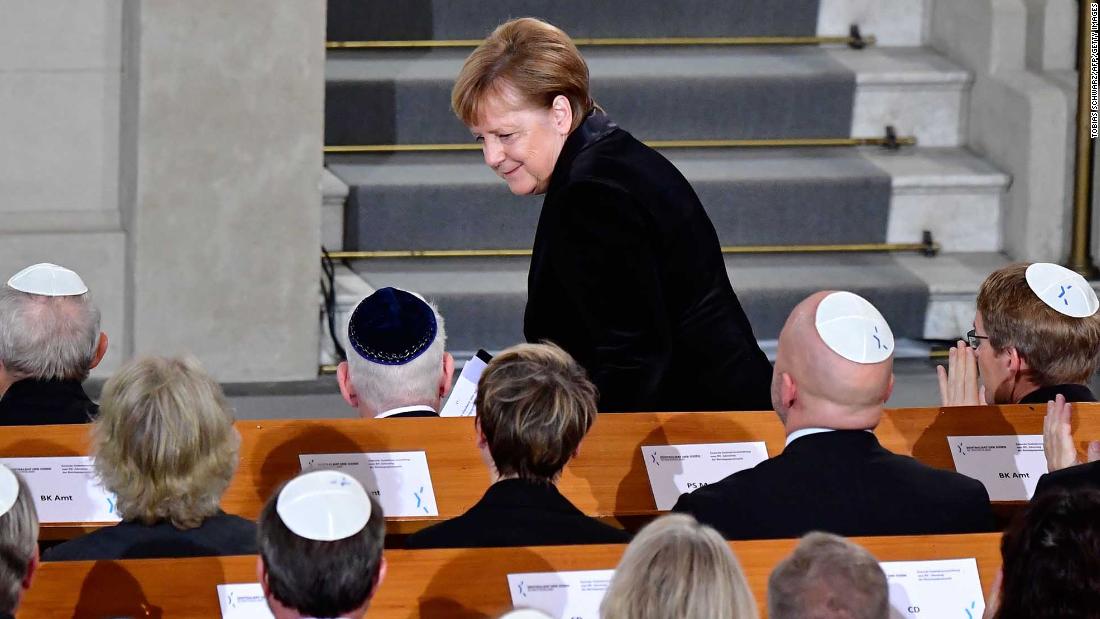
[ad_1]
She made the comments in a memorial speech marking 80 years since Kristallnacht or the “Night of Broken Glass,” the 1938 rampage of state-sponsored violence by the Nazi regime against Jewish communities, which caused widespread looting and destruction of Jewish properties across Germany and Austria.
Merkel spoke at Berlin’s Rykestrasse Synagogue, one of the 1,400 synagogues that were set ablaze that night.
“There are two urgent questions that we need to answer,” she said. “First, what did we really learn from the Shoah, this rupture of civilization? And second to the first question: Are our democratic institutions sufficiently strong so that an increase of anti-Semitism, or even if a majority presents anti-Semitism, it can be prevented in the future?”
She said that Kristallnacht had “paved the way to the Holocaust,” which she described as the “the greatest rupture of civilization.” But she also said that “the terror of Nazism did not happen overnight but grew gradually,” warning that the German public’s general acceptance of anti-Semitism is what allowed the Nazi regime to carry out the Holocaust.
Anti-Semitism and racism remain an issue that Germany grapples with today, she said: “Racism, anti-Semitism and prejudices did not just vanish.
“If today, 80 years after these pogroms and 70 years after the formation of the Federal Republic of Germany, we look at the situation, we see an ambiguous picture: There is flourishing life, Jewish life, an unexpected gift after the Shoah.
“But at the same time we see a worrying anti-Semitism. Which means Jewish life in this country, and in other places considered safe havens for the world, is threatened. This anti-Semitism has increasingly erupted into incitement of violence online and in public places.”
In her speech, Merkel said Germany must draw lessons from its history and must not tolerate anti-Semitism or racism in any form.
She cited several incidents this year, including a violent attack against a young man wearing the kippah in Berlin and one at a Jewish-owned restaurant in the eastern German town of Chemnitz.
She appeared to reference the growing power of the far-right Alternative for Germany (AfD) in parliament and appealed for vigilance in protecting democratic institutions and the rights of the individual.
“Every single individual is unique and never must be generalized,” she said.
“We must not allow our societies to be divided into us and them, we and them, we versus others. Every man has the right and can claim to be seen as an individual by the state. Secondly, democracy is the best of all feasible social systems. Even though life in a democracy may well be complicated on occasion. Democracy is more than to ensure majorities. It relies on balance. On a balance between majority and minority — between government and opposition. It relies on the division of powers.
She also warned that some segments of society were feeling left behind and looking to populist leaders offering “simple answers.”
“We live again today in an era of profound change,” Merkel added. “Rapid technological changes cause people to be worried. The rapid acceleration of digital progress means many people feel left behind.”
“At times such as these, there is always a worrying danger that those who give patently simply answers in reaction to these changes and difficulties will become more attractive. Simple answers that too frequently accompany a brutalization of language that is used on the streets and online. That is the kind of beginning that we need to resolutely oppose.”
“That is why today we remember and equally promise that we will be resolute in standing up against attacks to our pluralistic society. We remember, while knowing that staying silent and not doing anything about it, ultimately, means joining in.”

